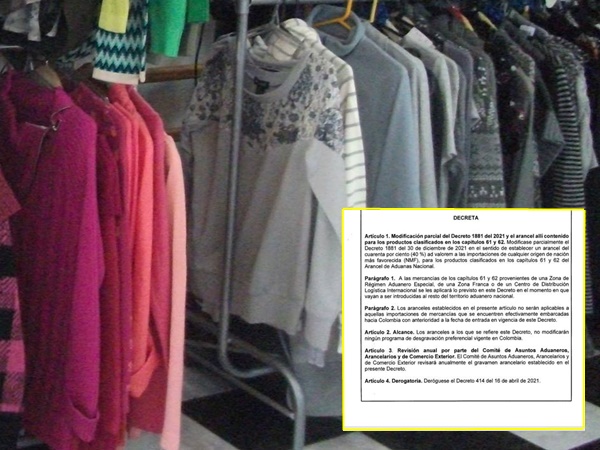According to experts, the 40% increase in garments “would not be fully assumed by the final consumer”, a part could be partially paid by the companies.
Colombian News
By means of a decree, the Government decided to increase tariffs in the clothing and textiles sector by 40%; with this imported garments such as suits, pants and skirts will have price increases.
And it is that months ago the country learned of the decree that, although it was only a draft, set a 40% tariff on imports of clothing in Colombia.
Now, the measure is a reality and the National Government established the conditions and characteristics of the tax, which applies specifically when certain conditions are met.
These include garments from countries with which Colombia does not have current trade agreements and when the FOB price (value of merchandise placed on board maritime transport) is less than or equal to US$10 per gross kilogram.
government of @petrogustavo it is at stake for industry and employment, a decree is issued to impose a tariff on imported clothing and with this it complies with the campaign proposal @CCConfection pic.twitter.com/63GYob6Tda
— Luis Fernando Velasco Chaves ? (@velascoluisf) December 28, 2022
government of @petrogustavo it is at stake for industry and employment, a decree is issued to impose a tariff on imported clothing and with this it complies with the campaign proposal @CCConfection pic.twitter.com/63GYob6Tda
— Luis Fernando Velasco Chaves ? (@velascoluisf) December 28, 2022
According to the decree, this system of thresholds per gross kilogram generated problems in the application of the tariff, due to the fact that there are garments classified as heavy and light.
In addition, the document states that this increase occurs because “it is necessary to promote a balance in international trade.
exclusions
Meanwhile, the decree states that the norm excludes garments from some countries such as Panama, Venezuela, the Pacific Alliance, and Canada.
It also includes the Andean community (Bolivia, Colombia, Ecuador and Peru, Chile, Argentina, Brazil, Paraguay and Uruguay); as well as the Caribbean community (Trinidad and Tobago, Jamaica, Barbados, Guyana, Antigua and Barbuda, Belize, Dominica, Grenada; Monserrat, Saint Kitts and Nevis, Saint Lucia, Saint Vincent and the Grenadines).
Korea, Costa Rica, Cuba, El Salvador, Guatemala and Honduras, Switzerland, Liechtenstein, Norway and Iceland, the United States, Israel, the United Kingdom, Mexico and EU member countries are also exempt.
The decree clarifies that clothing imports coming from these nations would not be affected.
However, garments from countries with which there is no agreement, such as China, should begin to pay the tariff.
It should be noted that according to experts, the 40% increase would not be fully assumed by the final consumer, a part could be partially paid by the companies.
“The tariffs established in this article will not be applicable to those imports of merchandise that are actually shipped to Colombia prior to the date of entry into force of this decree,” the document reads.
















